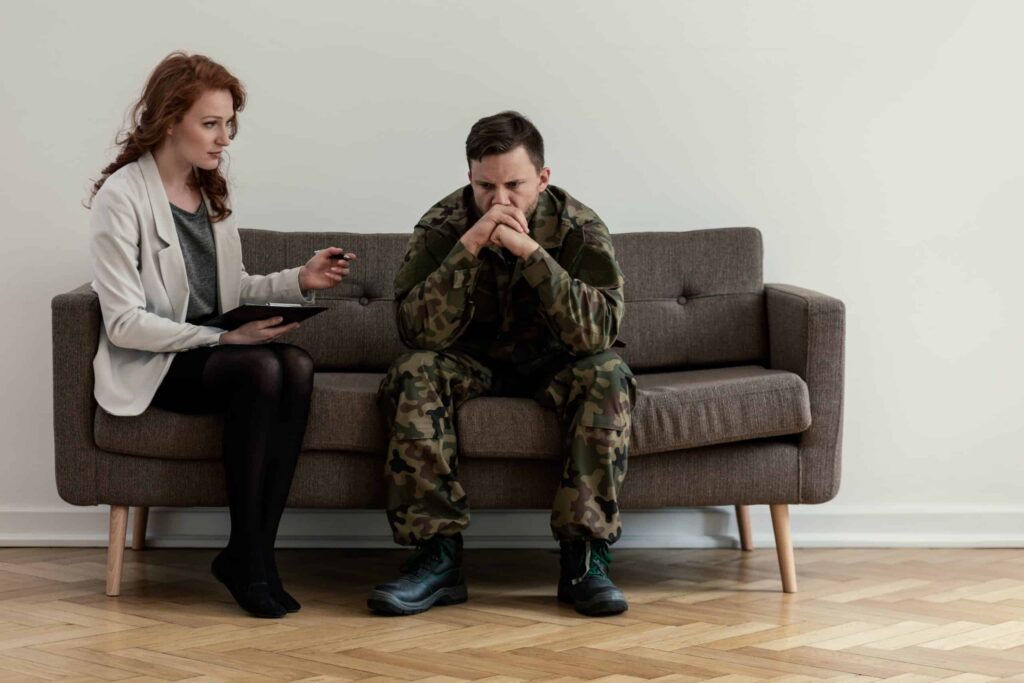Life transitions from civilian life to military life and the back to civilian life pose many adjustments and challenges for Veterans. The struggles Veterans face in adapting to re-joining family and friends, finding employment in the civilian workforce, and dealing with the after-effects of combat, military culture, and mental health issues are tough to reconcile. Finding help for new housing, transportation, and many other needs is difficult for independent Veterans who do not like asking for anything. Therefore, the hardest part for Veterans who struggle is knowing that they need help and being able to reach out to ask for it.
List of Struggles Our Veterans Face
Returning home from the military can be challenging because many Veterans enlisted in service straight out of high school and have never lived on their own. They only know how to live within the military and that is very different from civilian life. Struggles Veterans face differ, depending on many factors, but re-establishing relationships with family and friends and finding employment are common struggles. In addition, other issues combined with these important factors make the struggle much more challenging.
Struggles Veterans face in civilian life after leaving the military:
- Relationship with themselves
- Unemployment
- Homelessness
- Combat injuries or mental health symptoms
- Physical Handicaps
Breaking down the issue of unemployment further brings certain struggles Veterans face when trying to find civilian employment. In the military, servicemen and women are trained to do a specific job, but in civilian life, they face the obstacles of needing licenses, certifications, and degrees for employment they may feel qualified to do. Therefore, a Veteran’s resume may not translate to civilian employment, which is extremely frustrating. Many Veterans have appointments and meetings with VA services that they need time off from work to take care of. Many employers do not allow for additional time off for their civilian employees. Mental health instability is also a struggle for Veterans. Fitting into normal civilian workplaces can be difficult to acclimate while experiencing mental health symptoms.
Resources for Veterans After Leaving the Military
There are many resources available for Veterans after leaving the military to address the struggles Veterans face. The VA has many programs that will help with each of the barriers Veterans are trying to cope with. Private entities are also available to offer help to those struggling with mental health and substance abuse problems. Finding help can be as simple as reaching out to a family member or friend to help find the most comfortable route for each specific need. Sometimes reaching out is the toughest obstacle of all.
- There are many mentor programs that offer assistance to Veterans trying to integrate into civilian life after their service in the military
- Organizations are set up to deal with specific roadmaps for a new future. Many help with educational opportunities, work programs, and self improvement ventures to address physical and mental illnesses and injuries
- Educational training programs for employment understand what problems Veterans have in finding civilian employment and offer special programs for Veterans.
- Veterans seeking colleges and educational opportunities might use the VA for tuition assistance.
- Job boards and job fairs can target Veterans for employment opportunities.
Medical resources are available through the VA and/or the private sector. Finding a good doctor to address injuries and disabilities from the military and a mental health professional for depression, PTSD, anxiety, and substance abuse disorders is very important. Getting a referral from the VA can allow them to pay for the treatment with private practices. Struggles Veterans face may seem daunting but finding a connection in the community or with the VA once the troubles have been identified can make the journey easier.
Mental Health and Substance Abuse Treatment for Veterans
The VA offers many programs for mental health and substance abuse treatment for Veterans who are dealing with the struggles Veterans face. Some Veterans find it difficult to deal with the long wait for appointments and treatment when dealing with the VA. However, it’s imperative they get help immediately for the uncomfortable symptoms being experienced. Private treatment centers are equipped to help with substance abuse and mental health problems.
Taking the important step to reach out for help and admitting that there is a problem is crucial to recovery. Depression and PTSD rates among Veterans are much higher than in the general population. Experiencing symptoms from PTSD can interfere with life and be a major part of the struggles Veterans face after leaving the military. Many private treatment centers offer medical and mental health treatment to those who need recovery for co-occurring disorders.
A first step in self-care is following the recommendations from the professional community:
- Get regular exercise
- Eat regularly and healthy meals and stay hydrated
- Get regular sleep
- Take on a relaxing activity
- Set goals and create a list of priorities
- Practice gratitude
- Focus on positivity
- Stay connected to family, friends, and those you are connected to for treatment or help
Learning how to take care of yourself outside the military culture can be difficult at first, but dealing with the struggles Veterans face while learning self-care can help make the transition easier. Therefore, it is important that those with serious mental health and substance abuse issues seek treatment. You may need treatment to make a transition to civilian life possible.
Help for Veterans Facing Struggles After the Military
If you are in the midst of struggles Veterans face while trying to integrate into civilian life and experience mental health or substance abuse problems, please contact Sunrise Veterans Health. Reaching out to our admissions page is the first step you need to take. We can offer advice on your personal journey to living a happy and healthy life after the military.


